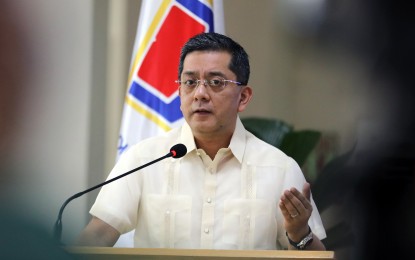
Comelec chairperson George Erwin Garcia (File photo)
MANILA – The Commission on Elections (Comelec) is prepared for a possible simultaneous holding of the Barangay and Sangguniang Kabataan Elections (BSKE) and the election of participants to a constitutional convention (con-con) to amend the 1987 Constitution in October.
"The Comelec is the implementing body for election laws. As long as the law provides for it, we will do it. The political department of the government will have the final say on this matter," said Comelec chairperson George Erwin Garcia in a message to reporters on Tuesday.
Garcia said they would be printing separate ballots for the con-con if this pushes through.
"We can have a separate ballot for the election of the delegates. We will print 67 million ballots," said Garcia.
At the same time, he noted that using the automated election system (AES) for the con-con delegates is not possible since there is not enough time.
The rescheduled BSKE is set on Oct. 30.
On Monday, the House Committee on Constitutional Amendments approved the still-unnumbered resolution of both houses calling for a con-con.
It proposes that the election of delegates from each legislative district to the constitutional convention would be set in October 2023, or simultaneously with the rescheduled village and youth polls.
The con-con will be composed of one delegate representing every legislative district in the country.
The resolution cited studies showing that particular economic provisions of the Constitution need to be revisited and recrafted so that the Philippines may become globally competitive and attuned to the changing times.
Foreign investors in mass media
House Deputy Speaker Aurelio Gonzales Jr. on Tuesday submitted a memorandum to the House Committee on Constitutional Amendments proposing a number of changes, including to allow foreign mass media investments in the Philippines.
Gonzales wants Constitution’s Section 11 of Article XVI on Mass Media to be rewritten to state: “The ownership of mass media shall be limited to citizens of the Philippines, or to corporations, cooperatives, associations and entities organized under the laws of the Philippines at least sixty per centum of whose capital is owned by such citizens, provided that its management shall be exclusive only to citizens of the Philippines.”
The proposed amendment “means that mass media will remain to be majority-owned and controlled and run exclusively by Filipinos, with foreign ownership to be limited to only 40 percent.”
The current provision under Section 11 states: “The ownership and management of mass media shall be limited to citizens of the Philippines, or to corporations, cooperatives or associations, wholly-owned and managed by such citizens.”
In allowing foreigners to invest in mass media, Gonzales said the sale of Philippine Depositary Receipts (PDRs) to foreigners by certain mass media companies was already brought up in the past House hearings.
PDRs are investment instruments that earn interest and can be sold for profit. Through PDRs, foreign nationals may directly own shares in mass media corporations, which is not in accordance with the present Constitution, Gonzales said.
He said his proposed amendment will improve and aid mass media networks, as foreign nationals would be openly welcome to invest directly in mass media corporations instead of going around the law through the use of PDRs.
Gonzales also proposes an amendment allowing foreigners and foreign corporations, associations and entities to own land not exceeding five hectares, provided they use it for manufacturing or trading activities.
He also seeks to leave to Congress the discretion of relaxing the present 40 percent foreign participation limit on the exploitation of the country’s natural resources by inserting the phrase, “or as may be provided by law” in Section 2 of Article XII.
Gonzales also suggests that Congress be allowed to create autonomous regions in other parts of the country by amending Section 15 of Article X on Local Government, which provides that such regions be established in Muslim Mindanao and the Cordilleras.
He cited the Bangsamoro Autonomous Region in Muslim Mindanao (BARMM), which, he said, is the second fastest growing region in the country with 7.5 percent economic growth.
BARMM’s development, he said, shows that “additional autonomous regions could be created as this could be of great help in the country’s economic expansion.”
No calendar of activities yet
Comelec spokesperson John Rex Laudiangco said the schedule of BSKE activities has not been finalized pending the Supreme Court’s (SC) ruling on the petition filed by election lawyer Romulo Makalintal questioning the law that postponed the December 2022 village and youth polls.
“So far it has not been set when is the filing of the certificates of candidacy (COC) due to the Macalintal vs Comelec case pending at the Supreme Court,” he said at the Laging Handa briefing. “We are waiting for the decision whether the petition is approved or junked.”
“As soon as there is a decision, we will have the schedule of activities for the BSKE including the date of the filing of COCs,” Laudiangco said.
He said the filing of COCs usually begins one month before the elections.
In his petition, Makalintal questioned the constitutionality of Republic Act No. 11935, which postponed the December 2022 village and youth polls to Oct. 30, 2023. (with Zaldy De Layola/PNA)
